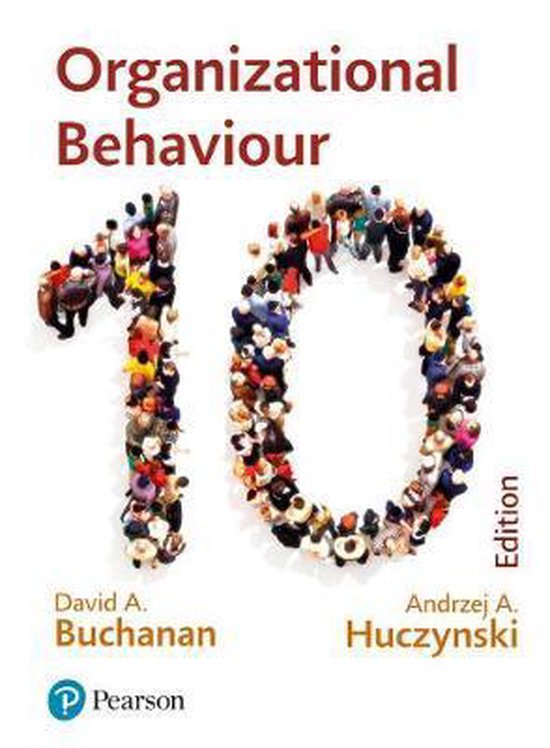ORGANISATIONAL BEHAVIOUR
1
,H1 Explaining organisational behaviour →
LECTURE 1
Organisational behaviour the study of the structure and management of organisations, their
environments, and the actions and interactions of their individual members and groups.
Organisational behaviour refers to the activities and interactions of PEOPLE in organisations
ORGANISATION:
The relationship between organisational behaviour and management practice is controversial.
Are we studying this subject in order to understand, or to advise, or both?
However, the focus on management is seen by some commentators as unhelpful, for at least
four reasons, concerning power inequalities, the subject agenda, multiple stakeholders, and
fashion victims.
- Power inequalities: Management is an elite group, with privileged access to information
and resources
- The agenda: A managerialist perspective focuses on issues of importance to managers,
concerning control and performance. Issues that are significant to individuals and
groups, theories that have limited practical use, and criticisms of the managerial role are
pushed aside.
- Multiple stakeholders: Management is only one group with a stake in organisational
behaviour. An understanding of this subject is of value to employees, trade unions,
2
, customers, suppliers, investors, and the wider community. Organisational behaviour is a
subject of individual, social and economic significance.
- Fashion victims: Managers follow the latest trends in thinking and technique, to
improve personal and organisational effectiveness.
Organisation: a social arrangement for achieving controlled performance in pursuit of collective
goals.
Controlled performance: setting standards, measuring performance, comparing actual with
standard, and taking corrective action if necessary
Organisational dilemma: how to reconcile inconsistency between individual needs and
aspirations, and the collective purpose of the organisation.
How can behaviour in organisations
be explained? To answer this question
systematically, we will first develop a
‘field map’ (Figure 1.1). Organisations
do not operate in a vacuum, but are
influenced by their wider context,
represented by the outer box on the
field map. One approach to
understanding context is ‘PESTLE
analysis’, which explores the Political,
Economic, Social, Technological,
Legal and Ecological issues affecting
the organisation and its members.
Fundamental attribution error: the tendency to explain the behaviour of others based on their
personality or disposition, and to overlook the influence of wider contextual influences.
→ In some cases, the individual could be at fault. But if we are not careful,the
fundamental attribution error leads to false explanations for the behaviour of
others.
• Context factors: The café has new competition, sales have fallen, they are closing next month,
and staff are angry about losing their jobs (economic factors). Perhaps closure is threatened
because sales are falling because the local population is in decline (social issues).
• Individual factors: The café staff are not coping with the demands of the job through lack of
training (learning deficit). Maybe some staff do not like dealing with a demanding public
(personality traits). Or they find the job boring and lacking in challenge (motivation problem).
• Group factors: The café staff are not a cohesive team (group formation issues). Maybe this
staff member is excluded from the group (a newcomer, perhaps) and is unhappy (group
structure problems). The informal norm for dealing with awkward customers like you is to be
awkward in return, and this person is just ‘playing by the rules’ (group norms).
• Structural factors: The organisation is bureaucratic and slow, and staff are anxiously waiting
for a long-standing issue to be resolved (hierarchy problems). Maybe there is concern about the
3
, way in which work is allocated (work design problems). Perhaps the café manager has to refer
problems to a regional boss (decision making issues), who doesn’t understand local issues.
• Management process factors: The autocratic café manager has annoyed the person serving
(leadership style), or this person is suffering ‘initiative fatigue’ following a restructuring (change
problems). Perhaps staff feel that management has made decisions without consulting
employees who have valuable ideas (management decision making problems.
Organisational Effectiveness is a multidimensional concept that can be defined differently
by different stakeholders. Stakeholders have different ideas about what counts as ‘effective’.
One approach to managing organisational effectiveness is the balanced scorecard. This
involves deciding on a range of quantitative and qualitative performance measures, such as
environmental concerns, employee development, internal operating efficiencies, and
shareholder value. The phrase quality of working life has similar problems, as we each have
different needs and expectations. Quality of working life is linked to organisational effectiveness,
and also to most of the other factors on the left hand side of our map. It is difficult to talk about
quality of working life without considering motivation, teamwork, organisation design,
development and change, human resource policies and practices, and management style.
Positivism is a perspective which assumes that the world can be understood in terms of
causal relationships between observable and measurable variables, and that these relationships
can be studied objectively using controlled experiments.
Operational definition: the method used to measure the incidence of a variable in practice.
Variance theory is an approach to explaining organisational behaviour based on universal
relationships between independent and dependent variables which can be defined and
measured precisely.
Constructivism is a perspective which argues that our social and organisational worlds have
no ultimate objective truth or reality, but are instead determined by our shared experiences,
meanings and interpretations.
Positivism assumes that there is an objective world ‘out there’ which we can observe, define
and measure. In contrast, constructivism argues that many aspects of that so-called objective
reality are determined by us. ‘Reality’ depends on how we and others see it, on how we
construct it socially (Berger and Luckmann, 1966).
What does it mean to say that ‘reality is socially constructed’? Suppose you want to measure
aggression at student functions. As a positivist, you first have to decide what counts as
‘aggression’. Your operational definition could be an ‘aggression index’ which you use to count
observable behaviours such as raised and angry voices, physical contact, pain and injury, and
damage to property. You might find, for example, that some functions are more aggressive than
others, that aggressiveness is higher later in the evening, that female students are just as
aggressive as male students, and so on. Now, suppose you observe one male student shout at
and punch another on the arm. The second student responds angrily and pushes the first
student away. A table is shaken, drinks are spilled, glasses are broken. Your ‘aggression index’
4






